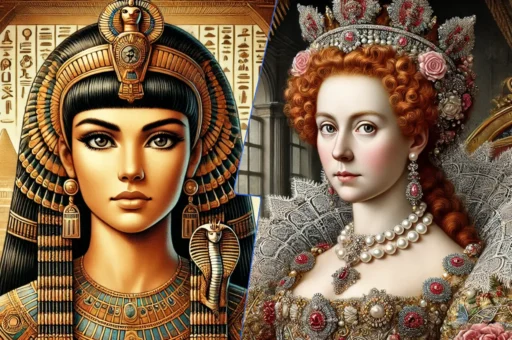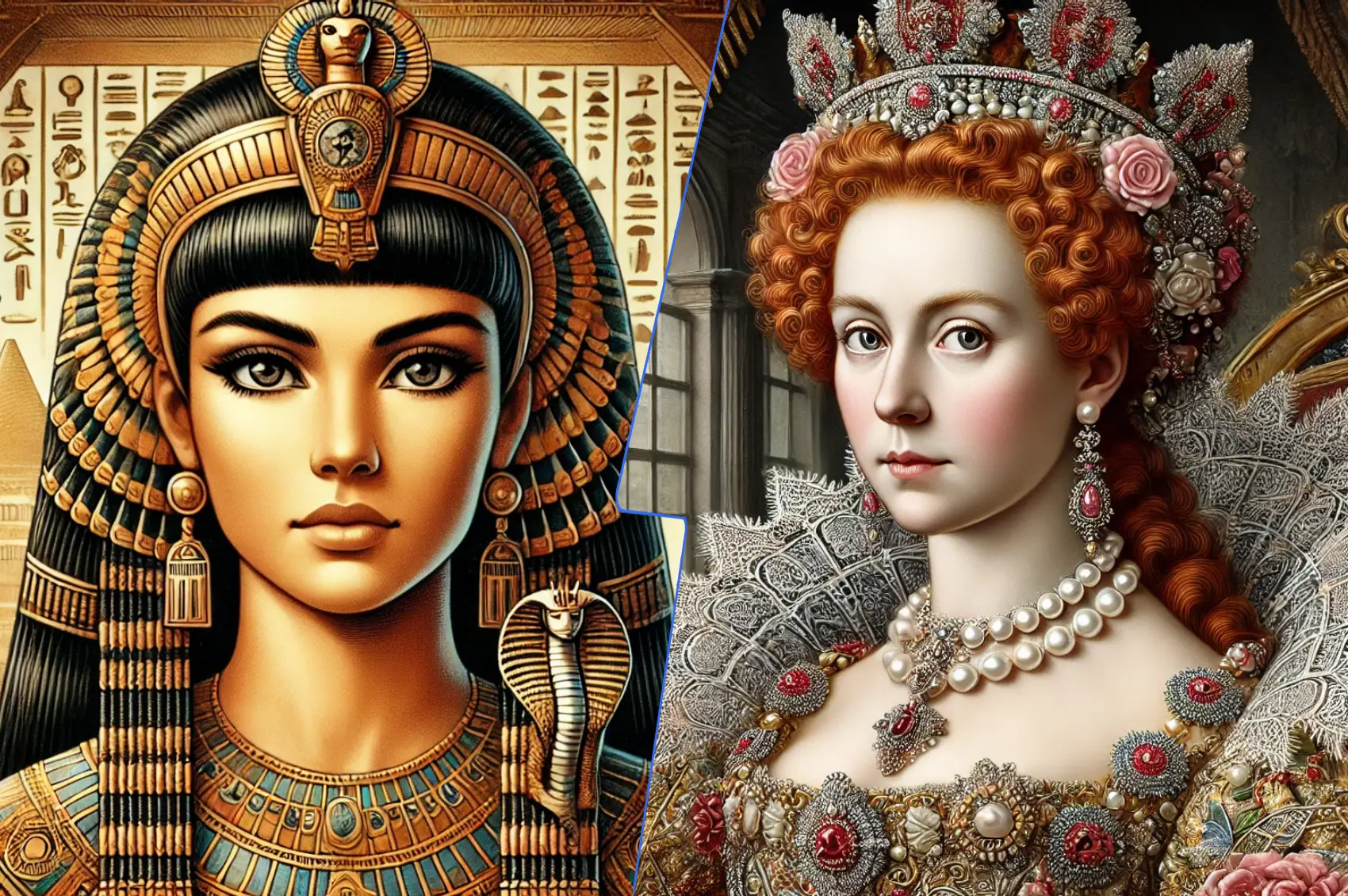Introduction
Cleopatra and Queen Elizabeth I are two of history’s most renowned female rulers, each leaving an indelible mark on their respective cultures and eras. This article delves into their lives, achievements, and enduring legacies, providing a detailed comparison to understand what makes each of these women unique and why they continue to resonate with people worldwide.
Early Life and Background
Cleopatra VII
Cleopatra VII was born in 69 BCE in Alexandria, Egypt. She was the daughter of Ptolemy XII Auletes and became the last active ruler of the Ptolemaic Kingdom of Egypt. Known for her intelligence, multilingual abilities, and political acumen, Cleopatra ascended to the throne at a young age and ruled alongside her younger brothers, whom she later outmaneuvered to become the sole ruler.
Queen Elizabeth I
Elizabeth I was born on September 7, 1533, in Greenwich, England. She was the daughter of King Henry VIII and Anne Boleyn. Elizabeth faced significant challenges early in life, including the execution of her mother and periods of imprisonment. She ascended to the throne in 1558, following the death of her half-sister, Mary I, and ruled until her death in 1603.
Achievements and Contributions
Cleopatra
- Political Alliances: Cleopatra formed significant political alliances with Roman leaders Julius Caesar and Mark Antony, using these relationships to bolster Egypt’s position.
- Naval Battles: She played a crucial role in the naval Battle of Actium, although ultimately defeated by Octavian.
- Economic Reforms: Cleopatra implemented economic policies that stabilized the Egyptian economy.
- Cultural Patronage: She was a patron of the arts and sciences, enhancing Alexandria’s status as a center of learning.
- Defiance Against Rome: Cleopatra’s resistance against Roman domination highlighted her determination to preserve Egypt’s independence.
Queen Elizabeth I
- Elizabethan Era: Her reign, known as the Elizabethan Era, is celebrated for its cultural renaissance, including the works of William Shakespeare.
- Defeat of the Spanish Armada: In 1588, her navy defeated the Spanish Armada, securing England’s maritime dominance.
- Religious Reforms: Elizabeth established the Protestant Church of England, navigating religious tensions between Catholics and Protestants.
- Economic Expansion: Her policies encouraged trade and exploration, leading to England’s emergence as a global power.
- Diplomacy and Governance: Elizabeth skillfully managed court politics and international diplomacy, maintaining relative peace and stability.
Personal Characteristics and Relationships
Cleopatra
Cleopatra was known for her charm, intelligence, and persuasive skills. She maintained complex relationships with Julius Caesar and Mark Antony, both of whom played crucial roles in her political strategies. Cleopatra had four children and was fiercely protective of her throne and legacy. Her enemies included Octavian, who eventually defeated her forces and annexed Egypt to the Roman Empire.
Queen Elizabeth I
Elizabeth, often referred to as the “Virgin Queen,” was known for her astuteness, strong will, and political savvy. She chose not to marry, using her single status as a diplomatic tool. Elizabeth had many close advisors, including Sir William Cecil and Sir Francis Walsingham, who helped her navigate the treacherous political landscape. Her primary adversaries included Mary, Queen of Scots, and Philip II of Spain.
Inspiration and Trusted Advisors
Cleopatra
Cleopatra drew inspiration from her Greek heritage and Egyptian roots, blending cultures to strengthen her rule. Her most trusted advisors included her loyal generals and courtiers who supported her reign.
Queen Elizabeth I
Elizabeth found inspiration in her father’s legacy and the need to stabilize England after periods of turmoil. Her most trusted advisors were key figures like Sir William Cecil, who served as her principal secretary, and Sir Francis Walsingham, her spymaster.
Numbers and Records
Cleopatra
- Support: Cleopatra commanded the loyalty of Egypt’s army and navy, though exact numbers are unclear.
- Achievements: Her reign lasted 21 years, during which she significantly influenced the politics of the Roman Republic.
- Cultural Impact: Her legacy endures in literature, film, and historical studies.
Queen Elizabeth I
- Support: Elizabeth had the backing of the English navy and the majority of her subjects, especially after the defeat of the Spanish Armada.
- Achievements: Her reign lasted 45 years, and she is often credited with bringing about the Golden Age of England.
- Cultural Impact: Elizabeth’s influence extends into modern culture, with numerous works of art, literature, and films depicting her life and reign.
Notable Achievements and Records
- Cleopatra: Often depicted in art and literature, Cleopatra remains a symbol of beauty and power.
- Queen Elizabeth I: Known for her eloquent speeches, such as the Tilbury Speech, and her patronage of the arts, including the works of Shakespeare.
Celebrity Comparisons
Cleopatra
- Elizabeth Taylor: Famously portrayed Cleopatra in the 1963 film.
- Vivien Leigh: Starred as Cleopatra in the 1945 film “Caesar and Cleopatra.”
- Monica Bellucci: Portrayed Cleopatra in “Asterix & Obelix: Mission Cleopatra” (2002).
- Sophia Loren: Played Cleopatra in “Two Nights with Cleopatra” (1954).
- Amanda Barrie: Starred as Cleopatra in “Carry On Cleo” (1964).
Queen Elizabeth I
- Cate Blanchett: Portrayed Elizabeth in “Elizabeth” (1998) and “Elizabeth: The Golden Age” (2007).
- Judi Dench: Played Elizabeth in “Shakespeare in Love” (1998), winning an Academy Award.
- Helen Mirren: Starred as Elizabeth in the TV series “Elizabeth I” (2005).
- Bette Davis: Played Elizabeth in “The Private Lives of Elizabeth and Essex” (1939) and “The Virgin Queen” (1955).
- Glenda Jackson: Portrayed Elizabeth in the TV series “Elizabeth R” (1971).
Comparisons and Conclusion
Both Cleopatra and Queen Elizabeth I were formidable rulers who navigated their reigns with intelligence, strategy, and charisma. Cleopatra’s influence on Roman politics and her efforts to maintain Egypt’s independence were significant, despite her ultimate defeat. Elizabeth’s reign brought stability, economic growth, and cultural flourishing to England, solidifying her legacy as one of the greatest monarchs in history.
Their unique qualities and accomplishments continue to inspire and fascinate people worldwide. Cleopatra’s story is one of romance and tragedy, while Elizabeth’s is one of resilience and triumph. Both women have left an indelible mark on history, demonstrating the power and influence of strong female leadership.
Engage with Us
What are your thoughts on Cleopatra and Queen Elizabeth I? Share your experiences and opinions in the comments below! Don’t forget to share this article on social media to join the conversation about these two remarkable queens.
Inbound Link Suggestions:
- Masters of Art: Leonardo da Vinci vs. Vincent van Gogh
- Comparing Two Giants: Abraham Lincoln & George Washington
- Breaking Bad vs. The Sopranos: A Battle of TV Legends
Outbound Link Suggestions:





